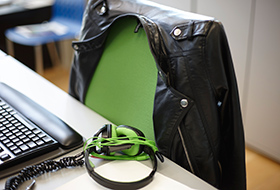Harnessing Society’s Potential
11/06/2016

In Carinthia another type of knowledge sharing is on its way – the educational lab. Designed as a research laboratory open to all, the educational lab is intended to promote life-long learning and spark interest in technological developments. Entrepreneurship, cultural and linguistic diversity should not only be conveyed, but lived.
Mathematics, computer science, natural sciences and engineering are the future. For many students, however, these subjects come across as dry and overly complicated. Frequently, the hidden charms of these disciplines are lost on them. Unjustly, as those working in the educational lab point out. This bad reputation has to be shaken off – and that’s precisely the mission the Lakeside Science & Technology Park took on in November 2016. With a large helping of imagination and commitment.
Four initiatives set the tone
NAWIMix: The natural science-themed teaching garden for teachers and students of the University College of Teacher Education in Carinthia was officially launched in November 2016.
Bildungskooperation Kärnten: A non-school-based learning environment equipped with modern infrastructure. In-depth and experimental work with school classes and interested groups started here in December 2016.
SmartLab: The open fabrication laboratory for students, researchers, entrepreneurs and enthusiasts is expected to open in March 2017.
Innovation Spirit and Entrepreneurship Lab (INSPIRE): The permanent experimental space for pupils, students and start-ups.
More about the educational lab.
The big question
The big question is: how should we teach and study in the future? In Carinthia, too, we are looking for the answer, but we are not only talking about it – we are working on concrete solutions to this highly relevant societal question.
Admittedly, the question is not new, but it still has not been resolved. It was discussed in a similar fashion as early as the 1960s. An interesting document in this regard is the Robbins Report on higher education. A short while ago British scientists rediscovered this document. The document features visions such as the idea that in the future everybody – from toddlers to grandparents – at the playground will be in the know regarding what is talked about and taught at universities. 50 years down the line we are still not even remotely close to making this vision a reality. The authors of Robbins Rebooted concluded that although today we do have institutions to prepare society for machines, there is still no system in place to share our knowledge. What’s missing is the willingness to cooperate and work together.
Further Reading
Liam Byrne, Robbins Rebooted, How We Earn Our Way in the Second Machine Age. The Social Market Foundation, 8/2014, pdf
Dagstuhl declaration: Bildung in der digitalen vernetzten Welt, 2/2016, pdf [in German]
11/06/2016






